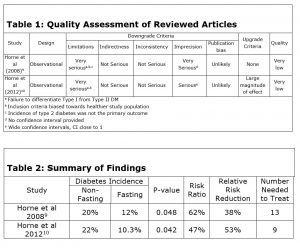The Use of Routine Periodic Fasting to Lower the Incidence of Type 2 Diabetes Mellitus
Abstract
Background: Diabetes mellitus is one of the most common chronic diseases in America and is associated with a number of severe complications including kidney failure, worsening of arteriosclerosis, an increased risk of heart attack and stroke, and loss of vision. The clinical course of diabetes supports the principle that once a patient is diagnosed with type 2 diabetes mellitus there is very little that can be done to reverse the disease process. This knowledge should put prevention of type 2 diabetes not only on the forefront of clinical practice but also of research. One such method of prevention currently being studied is routine periodic fasting. This review addresses the research associated with incidence of diabetes in populations that routinely fast.
Methods: Exhaustive search of available medical literature using MEDLINE-Ovid, MEDLINE-PubMed, CINAHL, and Web of Science was conducted. The following keywords were used: intermittent fasting, alternate day fasting, routine periodic fasting, intermittent energy deprivation, calorie restriction, diabetes, prediabetes, prediabetic state, type 2 diabetes, and diabetes mellitus. The articles were evaluated and assessed for quality using GRADE.
Results: Seventy-six articles were reviewed for relevancy. Two observational studies were found and reviewed. Both studies showed a decreased incidence in diabetes mellitus diagnosis in fasting groups compared to non-fasting groups. The quality of the studies was very low warranting further study and higher quality research.
Conclusion: Current research on using routine periodic fasting as a way to prevent or even modulate the disease course of type 2 diabetes is still limited but what research has been done shows that it could have some benefit as an adjunct to a normal healthy diet. It has the added benefit of being a no cost therapy to both the patient and the health care system and if proven to prevent diabetes.
Keywords: Intermittent fasting, and type 2 diabetes mellitus
(Click on image to enlarge.)
REVIEWED STUDIES:
Horne BD, May HT, Anderson JL, et al. Usefulness of routine periodic fasting to lower risk of coronary artery disease in patients undergoing coronary angiography. Am J Cardiol. 2008;102:814-819. e1.
Horne BD, Muhlestein JB, May HT, et al. Relation of routine, periodic fasting to risk of diabetes mellitus, and coronary artery disease in patients undergoing coronary angiography. Am J Cardiol. 2012;109:1558-1562.
AUTHORS: Matthew Croppi and Patrick Tutt graduated from Pacific University, School of PA Studies with an MS degree in August 2017.



No Comments Yet